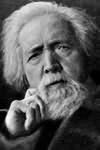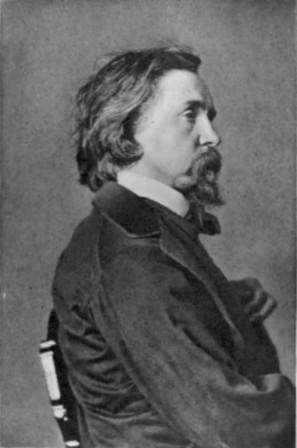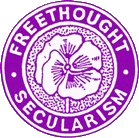G. J. Holyoake (1817 - 1906)

George Jacob Holyoake, son of a Birmingham mechanic and largely self-educated, joined the Owenites as a lecturer in 1838. In 1842 he was imprisoned for blasphemy.
He had said that in view of the state of the world it was ‘time to put the deity on half-pay’. For this he suffered six months in jail in very poor conditions.
Upon his release he evidently made use of the notoriety given to him by this injustice to publicise his public appearances, as in this poster from the LSS archives, advertising lectures in Leicester in 1843.

Though settled in London he was active all around the country and influenced a remarkable circle of friends, from Gladstone to George Eliot. Developing the ideals of Owen, he was involved in all the issues of the time: the struggle for a free Press, general education, rights of women, world peace. However his main organisational work was in Secularism and the Co-operative Movement.
He was the originator of the term "Secularism". He seems to have had an attractive personality, and persuasive manner, and expressed his ideas in a clear, rational way. At its height there were Secular Societies all around the country.
At the age of 80 he was appointed first chairman of the newly founded Rationalist Press Association.
G. J. Holyoake biography
G. J. Holyoake and cooperative movement
G. J. Holyoake Wikipedia
G. J. Holyoake tribute by Robert Ingersoll
Video - G.J. Holyoake (The origins of secularism & the National Secular Society)by Bob Forder.
Holyoake on Secularism
The following passage, attributed to G. J. Holyoake, is quoted in Fred Lee's thesis "Secularism from the Victorian age to the Twenty-first century: The History of the Leicester Secular Society". It was used by the Society in 1902 as one of three statements of its aims (the others were by Robertson and Gould).Secularism relates to the present existence of man, and to action, the issues of which can be tested by the experience of this life. Its object is the development of the physical, moral, and intellectual nature of man to the highest perceivable point, as the immediate duty of society. Secularism accepts no authority but that of Nature, adopts no methods but those of science and philosophy, and respects in practice no rule but that of the conscience, illustrated by the common sense of mankind. It values the lessons of the past and looks to tradition as presenting a storehouse of materials for thought, and in many cases results of high wisdom for reverence; but it utterly disowns tradition as a ground of belief, whether miracles and supernaturalism be claimed or not claimed on its side. No sacred scripture can be made a basis of belief, for the obvious reason that its claim always needs to be proved. Individual members yield whatever respect their own good sense judges to be due to the opinions of great men, living or dead, spoken or written, as also to the practice of ancient communities, national or ecclesiastical. But they disown all appeal to such authorities as final tests of truth.
Recollections of George Jacob Holyoake

from Random Recollections of the
Leicester Secular Society, March 1932
Frequent visitors in the "Eighties" were a number of old friends of my father's. [Among them] George Jacob Holyoake with his small, rather squeaky, voice and his closely reasoned, well phrased and witty lectures.
Though I well liked and greatly admired Mr. Holyoake and saw his great ability, I could not always agree with him, and felt that he was sometimes inclined to rejoice too soon at friendly approaches of the Great Ones of the Earth and to see breadth of mind where I could see only condescension or calculation. But he was a great Freethinker and always a good friend to our Society.
[The above preliminary comment is from page 12 of the Recollections. The following text is in a separate appendix, pages 62-66. (GPJ)]
As I have already said, George Jacob Holyoake was a friend of my father's from the days of his early manhood and a frequent visitor to our home. I cannot remember the time when his personality was not familiar to me. In the later years, when I was old enough to know and appreciate him and take an understanding interest in his conversation, he was a dignified and picturesque figure. He had the clear pink and white complexion of a child, flowing, wavy, silver white hair, white moustache and small pointed beard, with shaven cheeks. In winter time, and most of his visits happened then, he came in a voluminous fur lined overcoat which seemed to be almost too heavy for his small and seemingly fragile body to carry. In addition to other visits he was always, with the exception of infrequent times of illness, with us for our Anniversary meetings on the first Sunday in March. He once wrote to me: "As long as I live I shall count myself part of the Anniversary Meeting."
He was good company in the home, with a fund of reminiscences wittily told and a keen, live, interest in affairs of the day. Besides his great interests of Secularism and Co-operation, Politics occupied much of his time (he was made an honorary Life Member of the National Liberal Club). I well remember what a faithful friend he was to Sir Charles Dilke at the time of the notorious trials and how vehemently he expressed to me his disbelief in the truth of the charges made against Sir Charles.
He always stayed with one of my brothers (Mentor or Arthur) or John Barrs or us. Breakfasting at Mentor's once, he was busily engaged in dissecting a kipper when he quietly said: "Mentor, I don't think the Almighty meant these litle fish to be eaten, if he had he wouldn't have put so many bones in!"
Staying once with John Barrs, Mr. & Mrs. Barrs had to go out in the evening and left him writing (he always had a lot of writing to do) in their sitting-room. Barrs then had a fad not to use gas, electric light was not invented, so Mr. Holyoake was left with a paraffin lamp close beside him. Coming home an hour or two later Barrs found the room full of smoke and the old gentleman, sitting in a dim light, said "This lamp of yours gives a very poor light, Jack." He had kept on turning up the wick to get a better light, and, for his eyesight was poor then, had not noticed that the lamp was smoking horribly! Those who know what the smoke from a paraffin lamp can do will understand that Mr. Holyoake's face and clothes were covered with oily smuts and the room was in such a mess that all its contents had to be carefully cleaned and the room had to be re-papered!
Our members were much attached to him, they were proud of his interest in our Society and the constant, faithful, help he always gave us. Many a wise and witty speech he has made to us at our anniversary suppers, more intimate and personal than was possible at public meetings, and I well know how many treasured those opportunities for friendly association with him.
It was Mr. Holyoake who interested Mr. Thomas Allsop in our Society and induced him, in 1890, to offer us£100, on condition that we found£400 to provide a fund which would help finance the Society when the£100 per year left to us by my father ceased in 1893. We were able to collect the£400, so secured Mr. Allsopp's [sic] generous gift.
On my father's death Mr. Holyoake wrote to me (September 7th 1883) "We had been friends for 41 years. He had unusual qualities and there were few men for whom I had so much regard. Leicester will soon seem a different place to me."
On my marriage in 1886 he wrote to me (May 28th 1886) "There is no one who has more sincere congratulations to offer you on your marriage than myself. From your youth upwards, I have seen signs of good promise in you always — (kindly lines of undeserved praise) — It gave me pleasure that you included me among those who would welcome the silver memorials of what Tennyson happily calls the 'White Funeral' of single life."
In another letter (January 11th 1901) he says, "I see no reason why those who wish to be known as Atheists should not call themselves so. I have written no word against that. But the atheist who does not deny God is only half an atheist, or indeed less than that, without the Veracity of the Agnostic and open to the vulgar objection of cowardice brought against Agnostics. Being more than an Atheist I sail in another ship." I do not follow his argument but am glad to re-read the letter for it reminds me of many talks when I advocated the use of the definite word "Atheist" in preference to the indefinite one "Agnostic".
I have a curious verse, in Mr. Holyoake's handwriting and signed G.J.H. so I suppose he wrote it, I don't know to what it refers:-
"De Lord he know the Christian well
De Lord he know him by his yell
Safe in de arms ob Jesus.
And when de sceptic children cry
A Christian brick fly at dar eye.
Den Berbery make one holy shout
When Bradlaugh put dat Berbery out
Into de arms ob Jesus.
It is headed:- "Berbery and Bradlaugh. (Berbery the Wrestler and Bradlaugh the lecturer), A Congleton Melody."
At his funeral, Golder's Green Crematorium, in January 1906, farewell appreciations were spoken by Messrs. Greening, Gray and Vivian, for Co-operators, Mr. A. E. Fletcher for Liberalism, Mr. Joseph McCabe for the Rationalist Press Association, and myself for the Leicester Secular Society.











